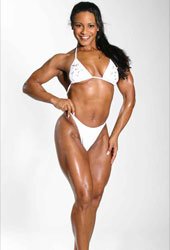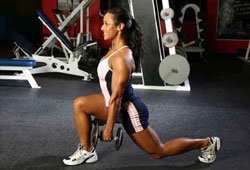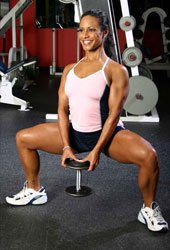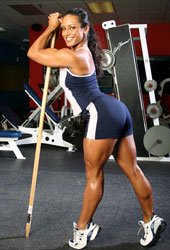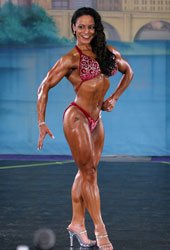I am often asked how I developed my legs the way I have, and what advice can I provide for those who wish to improve specific muscle groups in the leg. My first response is that all they need to do is become short like me (about 5' 2") and move into a housing complex where there are no elevators and you have to live on the top floor!
After the laughter has died down, I explain that one must first understand the significance of genetics. If you are tall, you simply will never have large, round muscle bellies because of the length of your bones. Comparatively, if you are short, you will never have "long, lean-looking" muscles as promised in so many infomercials.
| RELATED ARTICLE | |||
|
Author: Shannon Clark |
What a person can do, however, is maintain consistency of eating the proper foods, taking various supplements, and training with variety for optimum development. Let's explore in greater detail from top to bottom, and then I will provide sample workout programs.
 Glutes
Glutes 
-
The
gluteus maximus - the largest muscle in the entire human body - can be targeted through use of compound exercises and isolation movements. Compound movements involve the use of more than one muscle group and more than one joint.
An example is the "squat," where hip and knee flexion occur. Various forms of the squat (plie/ballet, deep with dumbbells, barbell or on the Smith Machine) and lunges (whether they're stationary or walking) work the large muscle group adequately.
-
Never let your knees extend past your toes when performing any leg exercise. To isolate this muscle, you can use a glute machine or perform rear leg raises.
 Quads
Quads 
-
There are 4 primary muscles that make up the
quadriceps which can also be developed optimally through compound movements (
squats,
leg press,
hack squat,
lunges,
sprints), isolation movements (
leg extensions), or isometrics (hold weight at 1/4 the distance of the concentric movement, or against a fixed object, for as long as possible).
Remember to always use proper form; you won't impress your buddies by lifting a ton of weight that can cause an injury and keep you out of the gym... and possibly getting fat!
 Hamstrings
Hamstrings 
-
Four major muscles also make up the hamstrings. All of the compound movements mentioned above target the hamstrings to a degree. Exercises such as the
straight-leg deadlift (hip flexion),
hamstring curl (
lying,
seated, or
standing), or glute-ham raise do an excellent job of targeting a nice set of muscular hamstrings.
| FORUM THREAD | |||
|
Started By: betty corral |
-
It is imperative not to neglect this important muscle group because the key to a balanced pair of nice legs in a physique contest, or simply for personal interest, is to work all opposing muscle groups. (i.e., hamstrings and quads, biceps and triceps, chest and back, and even calves and tibialis anterior-the shin muscle!)
 Calves
Calves 
-
This precious muscle is one of the most prominent on women when they wear high heeled shoes, and one of the most sought-after for men who need that last factor to place them higher than a fellow competitor in a physique competition!
-
Toe presses on a leg press machine,
seated and
standing calf raises on machines, and simple walking on your toes are all useful tools in developing shapely muscles in the lower leg. Because it is used so much in every day life, it may take a little extra effort (more reps and/or weight) to fatigue them.

Sample Program
Perform in any order you wish. Keep variety in your routine; for example, you can pre-exhaust the muscles by performing exercises that isolate the muscles, followed by the compound movement. Also note that you do not have to do all these exercises in one session! You can pick 2 compound exercises and mix those with isometric movements... it's up to you, your trainer, and above all, your level of conditioning.
- Any Type Of Squats Mentioned Above: 2 - 3 Sets 4-6 Reps Or More
- Leg Press And/Or Hack Squat: 2 - 3 Sets 4-6 Reps Or More
- Stationary/Walking Lunges: 2 - 3 Sets 20 Reps Or More
- Superset Leg Extension & Leg Curl: 2 - 3 Sets 4-6 Reps Or More
- Superset Seated & Standing Calf Raises: 2 - 3 Sets 20 Reps Or More
- Toe Raises/Ankle Flex (For Shins): 2 - 3 Sets 15 Or More Reps
 Nutrition
Nutrition 
-
Lean sources of
protein, high-fiber complex
carbohydrates,
vegetables,
healthy fats,
water, and proper
supplementation are the catalysts for making the training work for you and your
goals. I recommend that you consult a nutritionist/dietician who has years of experience to assist you, because nutrition is 75% of the battle! Even if you exercise "a lot," peak conditioning cannot be achieved without properly balanced eating habits.

Conclusion
This article provides a cursory overview of leg training. It is always recommended to first consult with your doctor to be cleared for exercise, consult with a certified trainer and nutritionist, and get plenty of rest! Search the web for credible sources of additional information.
Most importantly, learn to accept the body you were born with, make it the healthiest it can be, and carry yourself with self-confidence. Nobody can define what makes a body the most "attractive." Create your own standard!
-
Article written by Rachelle Cannon. You can visit her site at http://www.rachellecannon.com. Photos by Reg Bradford.



